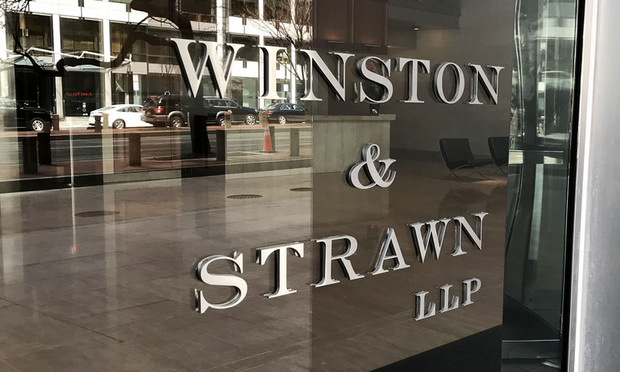Gavin Newsom Is Delivering for Plaintiffs Lawyers, Labor Advocates
Over the last four weeks, culminating with Sunday night's bill-signing deadline, Newsom has approved numerous pieces of worker friendly legislation with potentially sweeping implications.
October 14, 2019 at 07:10 PM
5 minute read
 Gov. Gavin Newsom of California. (Photo: David Paul Morris/Bloomberg)
Gov. Gavin Newsom of California. (Photo: David Paul Morris/Bloomberg)
Largely spurned for eight years by Gov. Jerry Brown, labor advocates and the plaintiffs bar have found a new political ally on workplace issues in Gov. Gavin Newsom.
Over the last four weeks, culminating with Sunday night's bill-signing deadline, Newsom has approved numerous pieces of worker friendly legislation with potentially sweeping implications.
A codified Dynamex law means gig economy employers must rethink their reliance on independent contractors. Settlement agreements can no longer contain no-rehire provisions. And employers, starting next year, cannot force new hires to sign arbitration agreements as a condition of their employment under the terms of a new law that may tee up a big case for the U.S. Supreme Court.
When Newsom took office in January, employment lawyers watched to see whether he would act as the business owner he is, one who has touts the tech industry and innovation, or whether he would govern as a labor friendly progressive. His first year in office has answered some of those questions.
"I think it was a very successful first year with the governor," said Mariko Yoshihara, legislative counsel and policy director for the California Employment Lawyers Association. "Governor Brown was really focused on litigation and preventing cases from being filed and addressing conflicts through administrative action."
The change in attitude from this governor's administration is "probably just a product of time," Yoshihara said. She added: "I think people are realizing that there are strategies employers are using to avoid and evade our employment laws."
Assemblywoman Lorena Gonzalez, D-San Diego, wrote both the Dynamex legislation and the workplace arbitration bill, a slightly different version of which Brown vetoed last year. A labor lawyer turned elected official, Gonzalez credited the advocacy of Newsom's wife, Jennifer Siebel Newsom, who endorsed the previous bill as a way of combatting sexual harassment in the workplace, and the governor's role as a father of four for some of her bills' successes.
"Different life experiences bring different perspectives," Gonzalez said.
The arbitration bill's signing coincides with new scrutiny on law firms' use of mandated alternative dispute resolution in their offices. Law student groups protested outside three DLA Piper offices last week to draw attention to the firm's continued use of mandatory arbitration.
DLA Piper junior partner Vanina Guerrero this month released an open letter to the firm's co-chairs, asking to be released from its mandatory arbitration agreement so she can pursue a public complaint against the co-managing partner of the firm's Silicon Valley office, Louis Lehot. Guerrero alleges Lehot sexually assaulted her after he recruited her to join the firm in 2018 Lehot, who has not responded publicly to the allegations, was let go by the firm on Friday. A statement from the firm said that Guerrero's "allegations have not been substantiated by [an] investigation to date."
 Winston & Strawn offices in Washington, D.C. (Photo: Diego M. Radzinschi / ALM)
Winston & Strawn offices in Washington, D.C. (Photo: Diego M. Radzinschi / ALM)And on Oct. 7, the U.S. Supreme Court declined to hear Winston & Strawn's appeal of a California court ruling that invalidated an arbitration agreement, which allowed a former partner to bring discrimination and retaliation claims against the firm in court. Lawyers for the firm had framed the case a chance for the high court to confront California courts' seeming aversion to arbitration.
Peter Wozniak, a Barnes & Thornburg partner in Chicago who represents employers in workplace litigation, said no one should read too much into the Supreme Court's denial in Winston & Strawn v. Ramos.
"The Supreme Court has been very supportive of the supremacy of the Federal Arbitration Act and any state law that may procedurally stand as an obstacle to arbitration are not to be enforced," Wozniak said.
California's new arbitration-restriction law, drafted with the help of San Francisco employment and civil rights attorney Cliff Palesky, will be "a very interesting issue," Wozniak said.
"When you have national employers, who have a uniform set of standards, uniform policies, now these companies may have to jump through hoops to decide whether they're willing to update all those things and follow the California prohibition," he said. "Or are they going to say, 'Look, we're going to challenge this. This is not the way we do business.'"
Gonzalez and Yoshihara said California bill was written in such a way to avoid conflict with the federal law. The state bill's provisions do not void signed arbitration agreements, so there is no pact to enforce under the federal law, they said.
The new law "just really zeroes in on an agreement having to be voluntary on each side," Gonzalez said.
Read more:
Governor Signs Bill Banning Forced Arbitration for Employees
Winston & Strawn Loses SCOTUS Bid to Stop Ex-Partner's Bias Suit
Newsom Signs Landmark Gig Labor Bill, as Court Cases Loom
9th Circuit: 'Dynamex' Worker Classification Test Applies Retroactively
This content has been archived. It is available through our partners, LexisNexis® and Bloomberg Law.
To view this content, please continue to their sites.
Not a Lexis Subscriber?
Subscribe Now
Not a Bloomberg Law Subscriber?
Subscribe Now
NOT FOR REPRINT
© 2025 ALM Global, LLC, All Rights Reserved. Request academic re-use from www.copyright.com. All other uses, submit a request to [email protected]. For more information visit Asset & Logo Licensing.
You Might Like
View All
California Court Denies Apple's Motion to Strike Allegations in Gender Bias Class Action

Lawsuit alleges racial and gender discrimination led to an Air Force contractor's death at California airfield
7 minute read
Lawsuit alleges Fox Sports ex-host harassed hairstylist and offered her $1.5M for sex
3 minute read
Trending Stories
- 15th Circuit Considers Challenge to Louisiana's Ten Commandments Law
- 2Crocs Accused of Padding Revenue With Channel-Stuffing HEYDUDE Shoes
- 3E-discovery Practitioners Are Racing to Adapt to Social Media’s Evolving Landscape
- 4The Law Firm Disrupted: For Office Policies, Big Law Has Its Ear to the Market, Not to Trump
- 5FTC Finalizes Child Online Privacy Rule Updates, But Ferguson Eyes Further Changes
Who Got The Work
J. Brugh Lower of Gibbons has entered an appearance for industrial equipment supplier Devco Corporation in a pending trademark infringement lawsuit. The suit, accusing the defendant of selling knock-off Graco products, was filed Dec. 18 in New Jersey District Court by Rivkin Radler on behalf of Graco Inc. and Graco Minnesota. The case, assigned to U.S. District Judge Zahid N. Quraishi, is 3:24-cv-11294, Graco Inc. et al v. Devco Corporation.
Who Got The Work
Rebecca Maller-Stein and Kent A. Yalowitz of Arnold & Porter Kaye Scholer have entered their appearances for Hanaco Venture Capital and its executives, Lior Prosor and David Frankel, in a pending securities lawsuit. The action, filed on Dec. 24 in New York Southern District Court by Zell, Aron & Co. on behalf of Goldeneye Advisors, accuses the defendants of negligently and fraudulently managing the plaintiff's $1 million investment. The case, assigned to U.S. District Judge Vernon S. Broderick, is 1:24-cv-09918, Goldeneye Advisors, LLC v. Hanaco Venture Capital, Ltd. et al.
Who Got The Work
Attorneys from A&O Shearman has stepped in as defense counsel for Toronto-Dominion Bank and other defendants in a pending securities class action. The suit, filed Dec. 11 in New York Southern District Court by Bleichmar Fonti & Auld, accuses the defendants of concealing the bank's 'pervasive' deficiencies in regards to its compliance with the Bank Secrecy Act and the quality of its anti-money laundering controls. The case, assigned to U.S. District Judge Arun Subramanian, is 1:24-cv-09445, Gonzalez v. The Toronto-Dominion Bank et al.
Who Got The Work
Crown Castle International, a Pennsylvania company providing shared communications infrastructure, has turned to Luke D. Wolf of Gordon Rees Scully Mansukhani to fend off a pending breach-of-contract lawsuit. The court action, filed Nov. 25 in Michigan Eastern District Court by Hooper Hathaway PC on behalf of The Town Residences LLC, accuses Crown Castle of failing to transfer approximately $30,000 in utility payments from T-Mobile in breach of a roof-top lease and assignment agreement. The case, assigned to U.S. District Judge Susan K. Declercq, is 2:24-cv-13131, The Town Residences LLC v. T-Mobile US, Inc. et al.
Who Got The Work
Wilfred P. Coronato and Daniel M. Schwartz of McCarter & English have stepped in as defense counsel to Electrolux Home Products Inc. in a pending product liability lawsuit. The court action, filed Nov. 26 in New York Eastern District Court by Poulos Lopiccolo PC and Nagel Rice LLP on behalf of David Stern, alleges that the defendant's refrigerators’ drawers and shelving repeatedly break and fall apart within months after purchase. The case, assigned to U.S. District Judge Joan M. Azrack, is 2:24-cv-08204, Stern v. Electrolux Home Products, Inc.
Featured Firms
Law Offices of Gary Martin Hays & Associates, P.C.
(470) 294-1674
Law Offices of Mark E. Salomone
(857) 444-6468
Smith & Hassler
(713) 739-1250






